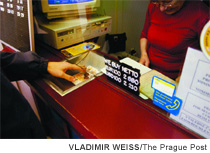
|
|
May 5th, 2008
|

|
| Real Estate Prague Prague Rentals Prague Apartments Prague Art & Antiques |
|
Tricks of the trade Exchange offices in the center of Prague use a series of wily ways to deceive tourists
Staff Writer, The Prague Post It's late Friday afternoon in Prague, and the Chequepoint exchange offices are doing a brisk trade. Tourists stream in and out of the company's branch on Old Town Square, which advertises a rate of 30.21 Kc to the euro. While most of the customers entering the shop seem upbeat, about half of those leaving appear confused. They count their money, look at the rates posted out front and scratch their heads. Others return inside to argue with the clerks. "This is a trick!" says Ralph Dentzer, a tourist from Germany, waving a handful of multicolored Czech crowns, about 2,400. It turns out the 30:1 euro/Kc rate that drew Dentzer in applied only to sellers of crowns who buy euros -- even though an estimated 95 percent of customers at Prague exchange offices are tourists buying crowns. A sign inside displays a rate of 27.92 Kc for one euro -- but that's only for transactions of more than 15,000 Kc ($642), as the fine print shows. A column off to the right displays the rate Dentzer got: 24.56. "I expected to get about 2,800 Kc," he said. "I didn't read the little print. This is incorrect. I've traveled all over Europe and I've never seen this. Why do they allow a place like this on their main square?"
"Bandits!" Dentzer shouted. After clerks refused to refund his money, he stood out front and warned away potential customers. "Don't go here! Bad rate!" Like many visitors who change money in Prague, Dentzer has an ATM card. But he considered it easier to change small amounts of cash as needed it rather than make repeated trips to ATM machines. He was drawn to Chequepoint by colorful signs with promising rates but missed the small print explaining the details. "It's rather misleading," said Radek Minovsky, a spokesman at the Czech Retail Inspection Office (COI). "But it's not punishable." In Britain, the same practices would be considered illegal, according to Britain's Trading Standards Institute, but tightening regulations for Czech exchange offices doesn't appear to be on the radar screen. Petr Muller, head of Prague City Hall's tourism department, calls the deception a law enforcement problem. Inspectors at COI, the relevant law enforcer, say legislation is too vague for them to take action. The Finance Ministry, charged with drafting legislation to regulate exchange offices, referred questions back to the COI. Meanwhile, hundreds of tourists get misled every day. "We expected to get 2,800 Kc for 100 euros," said Manfred Kehr, a German on vacation with his wife. "But you have to look at the fine print. That was only for big transactions. We ended up having to change 600 euros to get a good rate." The deception is not limited to misleading signs. Some tourists say they have caught clerks charging them a U.S. dollar-crown rate when handling euros, a "mistake" that costs customers 20 percent of their money. A popular scam is to slip a "free" map to customers with their cash. Customers don't usually realize, and clerks don't reveal, that the map costs 65 Kc. A reporter for The Prague Post witnessed this trick firsthand at the Chequepoint on Old Town Square. Ian Arbon, a manager, denied that Chequepoint employees were instructed to give customers unsolicited maps. He said that customers who ask for maps, but then realize they aren't free, are entitled to a refund. Travelers wanting to convert euros to U.S. dollars, or traveler's checks to U.S. dollars, have their money changed into crowns first. That practice is required under Czech law, according to clerks at American Express, but means exchanges profit twice.
Buyer beware Chequepoint policy does not provide refunds in cases where customers didn't understand the signs. Paul Rowling, an Englishman who has worked in the currency exchange business for 16 years, said tourists should approach exchange shops like any other business -- with caution. "When people buy shoes or trousers," he said, "they check out the price any number of times. For some reason, people behave differently when buying money. They can always ask beforehand. But they don't." Rowling also said customers shouldn't be surprised that exchanges in the center of Prague charge more. "People pay 80 Kc for a beer on Old Town Square, when they could pay 30 Kc a few blocks away," he said. "Exchange booths also charge more for the convenience of making transactions right in the center of town." As with many Czech tourist traps, Czechs themselves don't generally get burned by exchange offices, said Karel Pavlik, vice chairman of the Consumer Defense Association of the Czech Republic. Czechs have the advantage of communicating with clerks in their own language, and they're usually careful to get the details of deals beforehand. Czechs also by and large get good deals. The good rates that lure tourists into exchange offices are for trading crowns for foreign currencies -- what Czechs do when they are planning a trip abroad. Matt Reynolds can be reached at mreynolds@praguepost.com
|
|
![]()
The Prague Post, a weekly newspaper published in the Czech Republic.
To subscribe to the print paper, click here.
Unauthorized reproduction is strictly prohibited.
![]()





